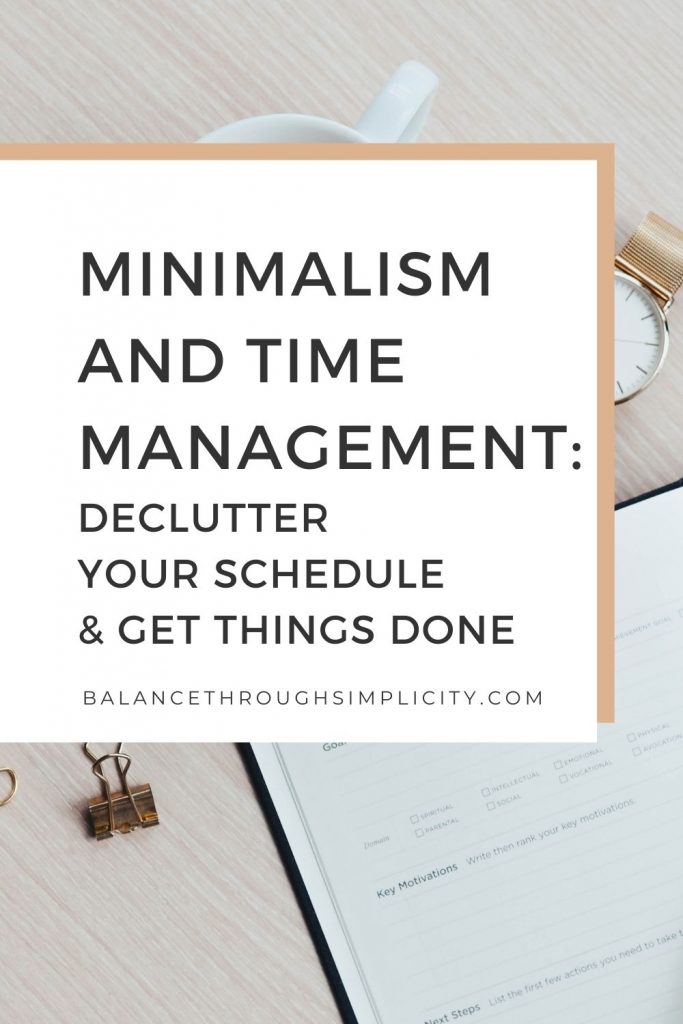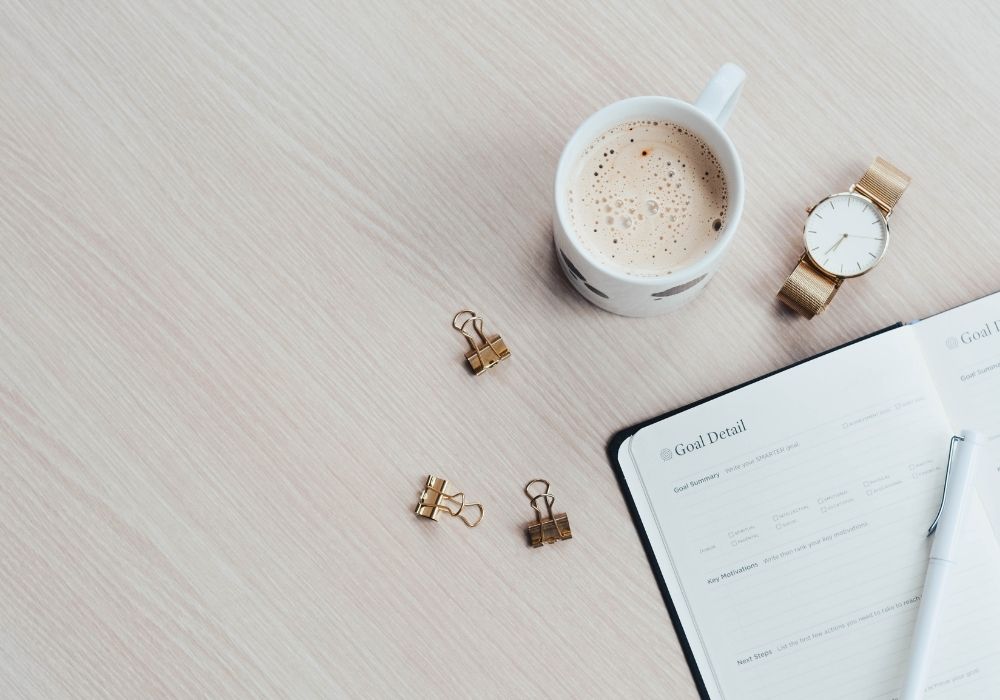MINIMALISM AND TIME MANAGEMENT: HOW THE MINIMALIST LIFESTYLE CAN IMPROVE PRODUCTIVITY
The minimalist lifestyle encourages you to sift out the clutter and intentionally focus on what matters. In many ways, this approach echoes the principles of good time management. In this article, we’re looking at the relationship between minimalism and time management and how a minimalist lifestyle can improve your productivity and help you get things done, simply and strategically.
MINIMALISM AND TIME MANAGEMENT
I’ve been interested in minimalism for nearly 10 years. Ever since my children were babies and I was juggling work, a young family, busy days and an equally busy life.
I’ve been interested in time management and productivity for much longer. Ever since I began my career, working hard and playing hard but using simple, strategic time management to get the right things done in less time so I had more time for other things.
Now I’m interested in the relationship between minimalism and time management because there are some definite parallels between the two. I’ve always been pretty good at managing my time and being productive but I think that my minimalist life has made me even better. Not perfect, but better!
In this article I’d love to share what I’ve learnt and hope that you can find some tips and ideas to use in your own life.
WHAT IS MINIMALIST LIVING?
Minimalism is a wonderful and empowering lifestyle which encourages you to think about what you let into and keep out of your life and how that serves and supports you.
Minimalism is about being intentional in your choices, actions and decisions so that you can keep clutter (in all its shapes and forms) away from your home and life. Without that clutter, you have time, space and freedom to follow your heart, do more of what you love and create a life that’s more on your terms. Not a life that’s lived on auto-pilot, just going through the motions.
The minimalist lifestyle is about intention. Deliberately and purposefully decluttering the different areas of your life. It requires you to be mindful, present and aligned with how you feel and what you want. This is the minimalist mindset – a mindset that encourages you to be clear on your priorities and not afraid to say no to anything that doesn’t honour and support those priorities.
I mention the minimalist mindset in this article so you might like to read more about how to think like a minimalist.
A minimalist lifestyle isn’t a magic wand to making life easy but in a busy, demanding world it can help you prioritise what’s important to you, rather than what everyone else thinks should be important to you.
If you’re feeling unsettled, fed up, frustrated or out of sync with your life, it might be worth getting curious about minimalism for your own life.
Further reading:
- The unexpected and life-changing benefits of minimalism
- What is minimalism and a few things it’s not!
TIME MANAGEMENT AND PRODUCTIVITY
Whether it’s at home or at work, getting more of the right things done is always helpful. I love to write about time management hacks and productivity tips because I believe they’re the secret sauce to simplifying life.
Like you can declutter your stuff, being productive helps clear the clutter from your time, to do list and schedule so you can do what you need to do in the most effective way possible. Decluttering also boosts productivity too.
More than just tips on how to be more organised and how to stop wasting time, good time management is all about being intentional with your time and what you do with it. That could be being busy without burning out, or slowing down when your mind and body requires it.
I have a whole section of resources about time management and productivity over here.

HOW THE MINIMALIST LIFESTYLE CAN IMPROVE YOUR PRODUCTIVITY
Below I’m exploring the link between minimalism and time management. I’d like to share some ways that minimalist living can help you manage your time and be more productive, along with some links and resources that you might like to explore.
1. Spending time on the ‘right’ things
With minimalism you focus on what’s important and adds value to your life and you learn to let the rest go. The same principle applies to how you manage your time, your calendar and your commitments:
- You are intentional about what you say ‘yes’ to and what you give your time to
- You spend your time on the ‘right’ things that are important to you rather than things that you feel obligated to do or have been chosen for you (unless, of course, your job or boss requires it!)
- You’re less likely to overload your calendar and therefore much less likely to double-book yourself, overrun on any appointments or stretch yourself too thin
2. Improves multi-tasking
Your list of things to do might sometimes be long and at some point, you’ll probably need to juggle a few things all at the same time. Life rarely fits into neat little boxes which you can deal with one by one, completing each before you move onto the next.
In the workplace, different projects, activities (and people!) also have different deadlines that compete with one another for your time and attention.
Sometimes multi-tasking is inevitable and unavoidable, but it’s much more efficient if you think like a minimalist.
- You can remove excess tasks on your list that needn’t be there
- You can more easily identify what’s most important and takes priority
- You can decide what needs to be done and when
3. Prioritising tasks
Minimalism encourages you to be mindful and present, focusing on what’s important at any given time.
When your mind is full of things to do and remember, distractions and other mental clutter, you can’t readily see what’s important because it’s all a jumbled fog of thoughts.
Declutter your To Do List and your mind with a more minimalist mindset and you’ll get clarity and mental space to identify and prioritise your tasks correctly.

4. Staying focused and avoiding distractions
Our environment plays a huge part in our psychological wellbeing and you can read more about the research into the negative effects of clutter here. In summary, when we have too much clutter around us, our stress levels rise and we’re less likely to think clearly without getting distracted.
By reducing our clutter, both the physical clutter around us and the mental clutter in our minds, we can find it easier to stay focused and avoid distraction.
Whether it’s in the workplace or at home, this is key to getting things done if we have lots to do in a short space of time. Focus on the task(s) at hand and don’t get distracted or waste time unnecessarily.
5. Keeping organised
Building on the point above, decluttering isn’t only good for our minds. Being minimalist about your home and work environments (your physical surroundings) also has some obvious, practical benefits:
- It helps things stay neat, tidy and organised
- You’ll be able to find things more quickly (whether it’s digital files, emails or paperwork)
- You’re less likely to lose things (and have to waste time looking for them)
- You can keep on top of any systems and procedures and…
- Generally work quicker and more efficiently
Here are some items or areas to declutter that will help with your time management and productivity:
- Computer filing system including folders, photos etc
- Desktop icons
- Email inbox
- Paperwork and paper filing systems
- Stationery
- Workspace or desk
- Bookshelves
- Noticeboards
- Home command centre
6. Increasing motivation
If you’re in the minimalist mindset, you’ll be thinking intentionally and deliberately about what you include on your schedule and To Do list.
You’re much more likely to complete each task without losing focus, forgetting about it or giving up because each task that you DO take on is important and adds value in some way. It’s not just on there to distract you or add to your workload.
When you’ve completed each of these important tasks, you’ll feel a sense of achievement to spur you on to completing the next. You’ll build up momentum and hopefully feel more motivated to get to the end of your list and achieve everything you set out to!
There’s nothing worse than spending your time doing something only to get to the end and wonder why you did it in the first place. Taking a minimalist approach in identifying your tasks in the first place will help avoid this.
7. Achieving targets
Minimalism helps you see the bigger picture in whatever you do, whether it’s at work, managing your home, looking after yourself or working on your own personal development.
Minimalism helps you to identify:
- What’s really important to you
- Patterns in your behaviour that you want to develop
- Negative habits that you want to avoid
- Areas for improvement and change
- Goals and ambitions that you want to reach.
This will all be much clearer to you because you’re more generally aware of everything that you do in life, what you let in and what you keep out.
Minimalism encourages you to be more intentional about your time, how you spend it and your life in general.
Minimalism forces you to identify what’s important to you and your priorities in life so you can set goals and targets based on this.

MINIMALIST GOAL-SETTING
Setting goals can be an important part of being productive. After all, it’s no use setting goals that you spend time, money and energy striving for when actually they’re no longer aligned with what you want or need.
Choose attainable, simple and actionable goals that mean something to you. They could be relevant for your work or in your personal life. Commit to achieving them, stay focused and revisit them often.
Goals that no longer support you, or that aren’t aligned with what you want from life are just yet another form of clutter that pulls you away from the path you’d rather tread.
Further reading:
- Minimalist goals to simplify your life
- How to set goals that really count
- How to refresh your goals and why it matters
A MINIMALIST SCHEDULE
Feeling busy with an overstuffed schedule? Perhaps it’s time to declutter that schedule, give yourself some free time and wiggle room. Stop over-booking or double-booking yourself, rushing from to A to C whilst forgetting B. Give yourself time to relax, recharge and reset and discover the value in slowing down and embracing a slower life. You can still get things done, but choose quality over quantity.
A minimalist schedule isn’t an empty one but it is an intentional one. Look back over the last week, month or year in your calendar and look forward to the next. Does everything on there still feel important and relevant? Is there anything that you can postpone or cancel if you’re feeling too busy or overstretched?
Saying no or being less busy isn’t a sign of failure or a measure of how fulfilling your life is. It might just be that you’ve not found a way to balance your needs with those of your busy life.
Further reading:
- How to be less busy
- 7 ways to be intentional with your time
- 18 signs you are too busy and what to do about it
MINIMALISM AND PLANNING
Part of my minimalist lifestyle is to plan better. I find that I have less stress and more time when I spend a little bit of time each day, week and month to plan ahead. Here are some resources to help you with planning your schedule and day in different ways:
- Things to do on Sunday for a productive week ahead
- 9 things to do each month to plan for the month ahead
- Monthly checklist (and free printable)
MINIMALISM AND ROUTINES
One of the other ways that minimalism helps my time management and productivity is by encouraging me to stick to habits and routines.
As part of a minimalist lifestyle, I’m always on the look-out for ways to make my life easier and simpler and this often involves making changes. Those changes can be big, sweeping changes like down-sizing to a smaller house or deciding on a career change, or it could be making little daily changes for tiny tweaks and adjustments. These daily changes often take the form of routines and habits.
Here are some examples and links to further reading:
- Daily habits to make life easier
- Minimalist morning routine tips
- How to get up earlier
- 20 habits for a clutter-free home
- How to create a simple evening routine
MINIMALISM AND SLOW LIVING
Time management and productivity isn’t just about doing things or even doing the ‘right’ things. Sometimes it’s about slowing down, relaxing and learning to wind down. And, I know this isn’t easy when most of life is encouraging us to DO more, ACHIEVE more and BE more.
Minimalist living requires us to question these norms and, wherever possible, intentionally choose another pace. A pace that doesn’t drain our energy or cause burn-out and stress, but instead challenges us in a positive way to do what we NEED to do and still have time, space and energy for what we WANT to do.
Here are some articles on minimalist living and slow living:
- Why it’s important to slow down sometimes
- How to find calm when life gets busy
- How to make time for yourself
RESOURCES ON TIME MANAGEMENT AND PRODUCTIVITY
Apart from knocking things off your To Do list and clearing space in your schedule, I hope you enjoyed this article on minimalism and time management and learning of other links between the minimalist lifestyle and time management and productivity.
Here are some resources on productivity and time management you might like:
- 15 ways to be more productive – Get more done in less time
- Maximise Your Time – My popular little time management course to help you make more time for what matters and be the boss of your schedule
DON’T MISS OUT!
I’m Antonia and on this blog I share practical inspiration to simplify your home, time and life. Follow me on Instagram, Facebook and Pinterest! You can also subscribe to Balance Through Simplicity and receive regular simplicity tips straight to your inbox for free. Make sure you never miss an article plus you’ll get a copy of my free Declutter Starter Kit as a welcome gift!

